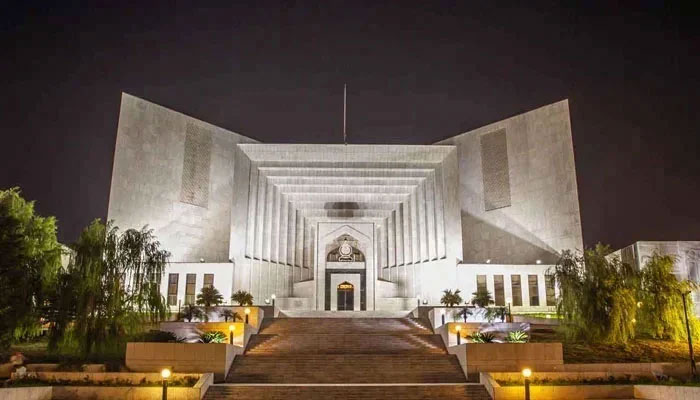IHC judges seniority case: Law talks about appointments, not transfers, SC told
Munir A Malik, lawyer for six judges, contended that government’s justification for transfers was absurd
ISLAMABAD: The Supreme Court adjourned for today (Thursday) hearing in the identical petitions, challenging the transfer of judges to Islamabad High Court (IHC) and seniority issue of judges.
A five-member constitutional bench, headed by Justice Muhammad Ali Mazhar, heard the petitions against the judges seniority and transfer to the Islamabad High Court.
Munir A. Malik, the lawyer for six judges, contended that the government’s justification for the transfers was absurd. He submitted that according to the Islamabad High Court Act, judges could be appointed from various provinces adding that the law talked about appointments from provinces not transfers.
He submitted that the Judicial Commission made appointments for only two of the five vacancies and the government claimed that since the Judicial Commission didn’t appoint judges, they did it themselves. Munir A Malik contended that the actual issue was the letter by six IHC judges which mentioned interference by sensitive institutions.
He said the core issue arose after Justice Aamer Farooq was elevated to the Supreme Court and the matter of appointing a new chief justice surfaced.
Justice Naeem Akhtar Afghan remarked that the letter by the six judges didn’t mention the president, prime minister or the law ministry.
Justice Afghan added that no specific judge was named either, but interference by sensitive institutions was highlighted. The judge questioned the relevance of the letter to the current transfers and further questioned whether the security agencies had dismantled the whole system and taken control.
Addressing Munir A Malik, Justice Shahid Bilal Hassan observed that such an incident had never occurred in his 13-year judicial career, and no one ever tried to contact him. He asked whether in the past the judges transferred to the IHC had taken oath there. Munir A Malik replied that under Article 200, no such transfers had occurred previously and that all transfers to the IHC were made under Article 193.
Justice Naeem Akhtar Afghan pointed out that Articles 193, 197, and 200 pertained to the judges’ appointments and transfers, while Article 194 only concerned the oath.
Justice Afghan noted that the law only mandated oath-taking from the chief justice of Islamabad High Court. Justice Mazhar said if a senior-most judge was transferred to a high court with 20 existing judges, he would then rank lowest in the new seniority list. At this, Munir A Malik replied that such a judge should refuse to accept the transfer. Justice Mazhar observed that Malik’s arguments implied that transfers were essentially new appointments.
Justice Naeem Akhtar Afghan inquired whether the posts vacated in the original high courts due to these transfers were still vacant or filled and if not, whether separate seniority lists will exist in both high courts. Munir A Malik replied that according to the Indian constitution, a judge’s seat becomes vacant upon transfer, while in Pakistan, the seat only becomes vacant upon resignation or removal.
Meanwhile, the court adjourned the hearing for today (Thursday) while Munir A. Malik will continue his arguments.
-
 King Charles ‘very Much’ Wants Andrew To Testify At US Congress
King Charles ‘very Much’ Wants Andrew To Testify At US Congress -
 Rosie O’Donnell Secretly Returned To US To Test Safety
Rosie O’Donnell Secretly Returned To US To Test Safety -
 Meghan Markle, Prince Harry Spotted On Date Night On Valentine’s Day
Meghan Markle, Prince Harry Spotted On Date Night On Valentine’s Day -
 King Charles Butler Spills Valentine’s Day Dinner Blunders
King Charles Butler Spills Valentine’s Day Dinner Blunders -
 Brooklyn Beckham Hits Back At Gordon Ramsay With Subtle Move Over Remark On His Personal Life
Brooklyn Beckham Hits Back At Gordon Ramsay With Subtle Move Over Remark On His Personal Life -
 Meghan Markle Showcases Princess Lilibet Face On Valentine’s Day
Meghan Markle Showcases Princess Lilibet Face On Valentine’s Day -
 Harry Styles Opens Up About Isolation After One Direction Split
Harry Styles Opens Up About Isolation After One Direction Split -
 Shamed Andrew Was ‘face To Face’ With Epstein Files, Mocked For Lying
Shamed Andrew Was ‘face To Face’ With Epstein Files, Mocked For Lying -
 Kanye West Projected To Explode Music Charts With 'Bully' After He Apologized Over Antisemitism
Kanye West Projected To Explode Music Charts With 'Bully' After He Apologized Over Antisemitism -
 Leighton Meester Reflects On How Valentine’s Day Feels Like Now
Leighton Meester Reflects On How Valentine’s Day Feels Like Now -
 Sarah Ferguson ‘won’t Let Go Without A Fight’ After Royal Exile
Sarah Ferguson ‘won’t Let Go Without A Fight’ After Royal Exile -
 Adam Sandler Makes Brutal Confession: 'I Do Not Love Comedy First'
Adam Sandler Makes Brutal Confession: 'I Do Not Love Comedy First' -
 'Harry Potter' Star Rupert Grint Shares Where He Stands Politically
'Harry Potter' Star Rupert Grint Shares Where He Stands Politically -
 Drama Outside Nancy Guthrie's Home Unfolds Described As 'circus'
Drama Outside Nancy Guthrie's Home Unfolds Described As 'circus' -
 Marco Rubio Sends Message Of Unity To Europe
Marco Rubio Sends Message Of Unity To Europe -
 Savannah's Interview With Epstein Victim, Who Sued UK's Andrew, Surfaces Amid Guthrie Abduction
Savannah's Interview With Epstein Victim, Who Sued UK's Andrew, Surfaces Amid Guthrie Abduction




